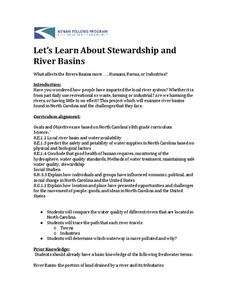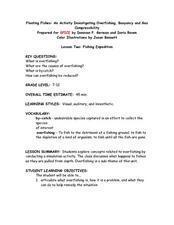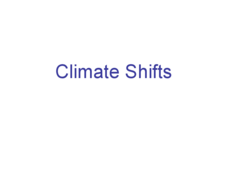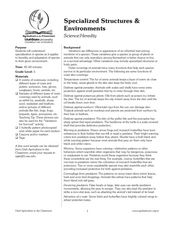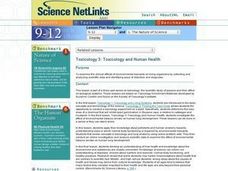Kenan Fellows
Let's Learn About Stewardship and River Basins
What does it mean to be a good steward? Middle school environmentalists learn to care for their state's waterways through research, a guest speaker, and poster activity. Groups must locate and learn more about a river basin and the human...
Curated OER
An Introduction to Primate Biology
Students examine why humans are classified as primates and what features they share with other members of the order. In this investigative lesson students divide into groups and complete their lab station.
Curated OER
Land Use Unit
Students identify factors in human society and the natural environment aree interdependent. They analyze interdependencies demonstrated in various situations and occurances.
Curated OER
Urban Ecosystems 2: Why are There Cities? A Historical Perspective
Second in a series of five lessons, this lesson encourages preteens to consider cities as urban ecosystems. First, they keep a food diary for a few days. They visit the Natrional Agricultural Statistics Service website for current data...
Curated OER
Floating Fishes: Fishing Expedition
A referenced PowerPoint is not included, but this lesson can still make an impact with emerging environmentalists. After introducing them to the facts about overfishing, they experiment with a fishing simulation using colored beads and...
Curated OER
Galileo's Thermometer: Measuring the Density of Various Unknown Liquids
Sprouting scientists explore the concept of density by making mass and volume measurements for five different liquids. From these measurements, they calculate densities. They apply their learning to explain Galileo's thermometer works...
National Geographic
Spot Where You DON'T Get Your Seafood
When your class is examining the fishing industry or sustainable practices, you can use this brief activity to demonstrate the global impact our food choices have. Overharvesting, overfishing, and bycatch are important topics to address...
Curated OER
Climate Shifts
Eight slides of information related to shifts in the climate make up this presentation. The vocabulary and concepts displayed are geared toward high school meteorology learners. Content is not cohesive from slide to slide, but the...
Virginia Department of Education
Changes in Ecosystems
How does water pollution affect the environment? Provide your class with the resources to answer this question as they learn about eutrophication and ecosystem changes. Over two weeks, they simulate the effects of pollution on the...
It's About Time
Factors Affecting Population Size
How do we predict future population growth? Young researchers investigate various factors affecting the size of our population. As they calculate and interpret graphs to determine factors that could potentially affect increases and...
It's About Time
Succession in Communities
What occurs following a natural disaster? High schoolers research this question and others as they investigate natural succession after a disaster. First, as they differentiate between primary and secondary succession, they explain how...
Earth Day Network
Staying Green While Being Clean
Clean up the environment with a lesson that focuses on replacing hazardous cleaning supplies with green, environmentally-friendly products. Using a dirty patch of surface as a control area, kids clean other parts of various surfaces...
Curated OER
Human Evolution
Students recognize that achievements of human beings throughout human history can be considered part of the ongoing story of human evolution. They research settings such as the biosphere and Mars and write imaginative short stories using...
Howard Hughes Medical Institute
Got Lactase? The Co-Evolution of Genes and Culture
Does the human body evolve as quickly as human culture? With a stellar 15-minute video, explore the trait of lactose intolerance. Only about 1/3 of human adults seem to still have the enzyme lactase and therefore, the ability to digest...
NOAA
I Can't Breathe!
The Gulf of Mexico dead zone, an area of low oxygen that kills marine life, costs the United States $82 million every year. Young scientists research anoxic ocean environments then come up with a hypothesis for the cause of the Gulf of...
University of Minnesota
Mirroring Emotions
Do you ever give your class the "teacher look"? Without saying a word, they become silent and engaged (hopefully). How do they know what you're thinking? Explore the concept of nonverbal communication and how it relates to our mirror...
Curated OER
Air and Water in the Environment
Second graders participate in a three part lesson in which they identify and describe forms of moisture in the environment. Part one of the lesson involves the three stages of the water cycle, part two focuses on creating humidity by...
Curated OER
What is a Living Thing, and How Does a Living Thing Respond to Its Environment?
Students investigate how living things interact with their environment. In this living things lesson, students complete lessons for science investigations on what living things have in common. Students study cells, complete...
Curated OER
Specialized Structures and Environment
Fifth graders read about how different animals protect themselves, and how characteristics give animals an advantage in their environment. Students then discuss a variety of "outer" wear for humans, and what they might choose to wear in...
Curated OER
Hazardous Chemicals? Not in my Water!
Students reflect on the effects of their actions on the environment. In this community service instructional activity, students investigate the hazardous quality of products within their homes. Student educate their families and...
Curated OER
Image Classification
Students explore what are "multi-spectral" or "multi-band" images? They investigate how landscapes change over time- at least over the time-span of satellite imagery, particulary due to human influences. Students explore how to train...
Curated OER
Toxicology And Human Health
Students examine the clinical effects of environmental toxicants on living organisms by collecting and analyzing scientific data and identifying ways of detection and diagnosis.
PBS
Technology: Conveniences and Consequences
It's a delicate balance—using technology to improve our lives while still protecting the environment, and ourselves, from the hazards of technology use. Class members examine statistics about the increase in media use, complete a survey...
Curated OER
Litter From Lunchtime
Students explore environmental care by participating in a litter identification activity. In this food trash lesson, students discuss the destruction litter causes in our environment and ways we can avoid littering ourselves. Students...


